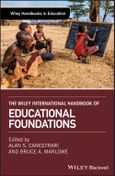Promotes a model of critique for teachers, scholars, and policy makers to challenge established educational practice in a global context.
The Wiley International Handbook of Educational Foundations features international scholars uniquely qualified to examine issues specific to their regions of the world. The Handbook provides readers with an alternative to the traditional texts in the foundations of education by taking aim at the status quo, and by offering frameworks from which teachers and scholars of education can critically evaluate schools and schooling. Throughout, the essays are grounded in a broad historical context and the authors use an international lens to examine current controversies in order to provoke the kinds of discussion crucial for developing a critical stance.
The Handbook is presented in six parts, each beginning with an Introduction to the subject. The sections featured are: Part I. Challenging Foundational Histories and Narratives of Achievement; Part II. Challenging Notions of Normalcy and Dominion; Part III. Challenging the Profession; Part IV. Challenging the Curriculum; Part V. Challenging the Idea of Schooling; and Part VI. Challenging Injustice, Inequity, and Enmity.
The Wiley International Handbook of Educational Foundations offers unique insight into subjects such as:
- Educational reform in India, Pakistan, and China
- The global implications of equity-driven education
- Teacher education and inclusionary practices
- The Global Educational Reform Movement (G.E.R.M.)
- Education and the arts
- Maria Montessori and Loris Malaguzzi
- Legal education in authoritarian Syria
The Wiley International Handbook of Educational Foundations is an important book for current and aspiring educators, scholars, and policy makers.
Table of Contents
Dedication v
About the Editors xi
About the Contributors xiii
Preface: The Wiley International Handbook of Educational Foundations xvii
Acknowledgments xxiii
Part I Challenging the Foundations Narrative 1
1 A Story of Hegemony: The Globalization of Western Education 3
Alan S. Canestrari and Margaret M. Foster
2 Community Development: Learning from Popular Education in Latin America 21
Liam Kane
3 Educational Reform in India and Pakistan: Successes and Missed Opportunities 31
Ali Hamza and Divyanshi Wadhwa
4 Rethinking African Educational Development 47
Elsa Wiehe
Part II Challenging Notions of Normalcy and Dominion 65
5 Implicit Bias and the Bias Awareness Gap: The Global Implications of Equity‐Driven Education 67
Gloria Graves Holmes
6 Linguistic Hegemony and “Official Languages” 89
Timothy Reagan
7 National Education in France: From Ideological Rigidity to Identity Flexibility 107
Samim Akgönül
8 The Move Towards Inclusive Education in Ethiopia 123
Alemayehu Tekelemariam Haye
Part III Challenging the Profession 141
9 Teacher Education in an Audit Culture 143
Alexander Bean and Rachel Rush‐Marlowe
10 Teacher Education and Inclusionary Practices: Sharing Delhi University Experiences 157
Jyoti Raina
11 Teachers’ Work and Teachers’ Unions in the Global Education Reform Movement (GERM) 175
Lois Weiner and Mary Compton
12 Understanding Japan’s Sensei: The Status of Teachers in Japan 189
Ryan Monahan
Part IV Challenging the Curriculum 205
13 Education and the Arts: Educating Every Child in the Spirit of Inquiry and Joy 207
Mariale M. Hardiman
14 Constructivist Foundations, Learning Standards, and Adolescents: The Chaotic World of American Secondary Education 229
Marilyn Monks Page and Samantha Painter
15 Teaching and Learning with Technology 245
Matthew T. Marino, Maya Israel, Eleazar Vasquez III, Karin M. Fisher, and Ben Gallegos
16 Advancing Pharmaceutical Health: Education towards Better Global Health 261
Iman A. Basheti and Bandana Saini
Part V Challenging the Idea of Schooling 283
17 Less Stress and More Well‐Rounded Development : Recent Education Reforms in China and Why They Don’t Work 285
Gaoming Zhang
18 “For a Future Tomorrow”: The Figured Worlds of Schoolgirls in Kono, Sierra Leone 301
Jordene Hale
19 When More Is Not Necessarily Better: Insights into Romanian Higher Education 321
Teodora A. Șerban‐Oprescu and George L. Șerban‐Oprescu
20 Historical Features of Early Childhood Education: Maria Montessori and Loris Malaguzzi 335
Nicola S. Barbieri
Part VI Challenging Injustice, Inequity, and Enmity 351
21 Legal Education in Authoritarian Syria: Reflections on Studying and Teaching in the Damascus Law Faculty 353
Abdulhay Sayed
22 Developing Conscientious Institutions of Higher Education in Southeast Asia: A Framework for Action 369
Teay Shawyun
23 Can Academics Across the Divide Teach Together?: The Israeli/Palestinian Experiment 399
Manuel Hassassian and Edward (“Edy”) Kaufman
24 Eugenic Ideology and the Institutionalization of the “Technofix” on the Underclass 415
Ann G. Winfield
Part VII PISA Appendices 437
Appendix A 439
Appendix B 441
Index 445








